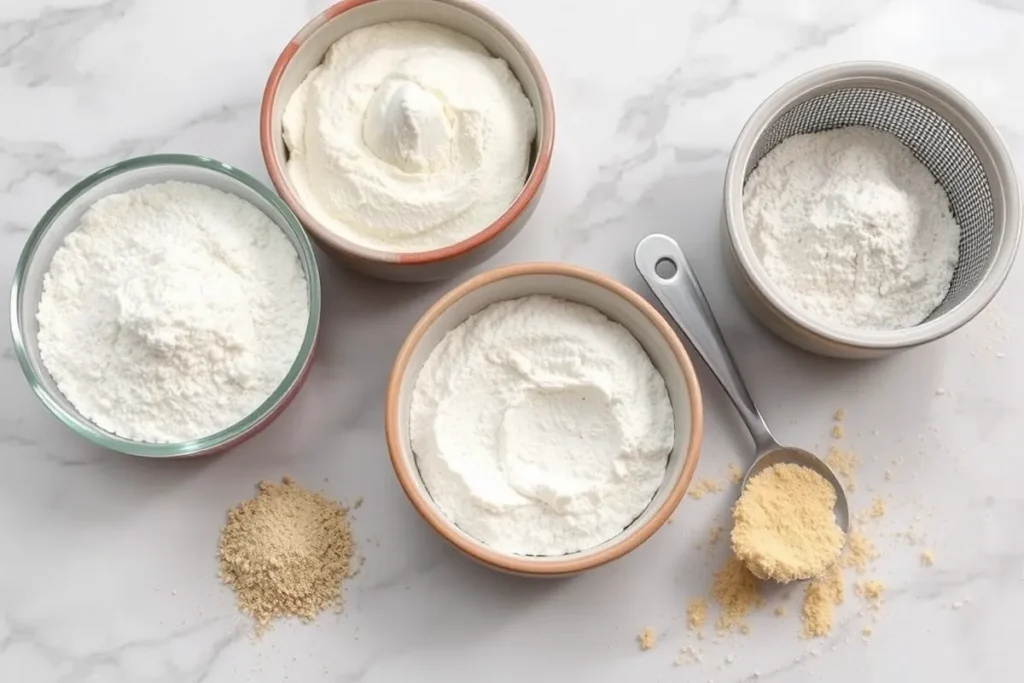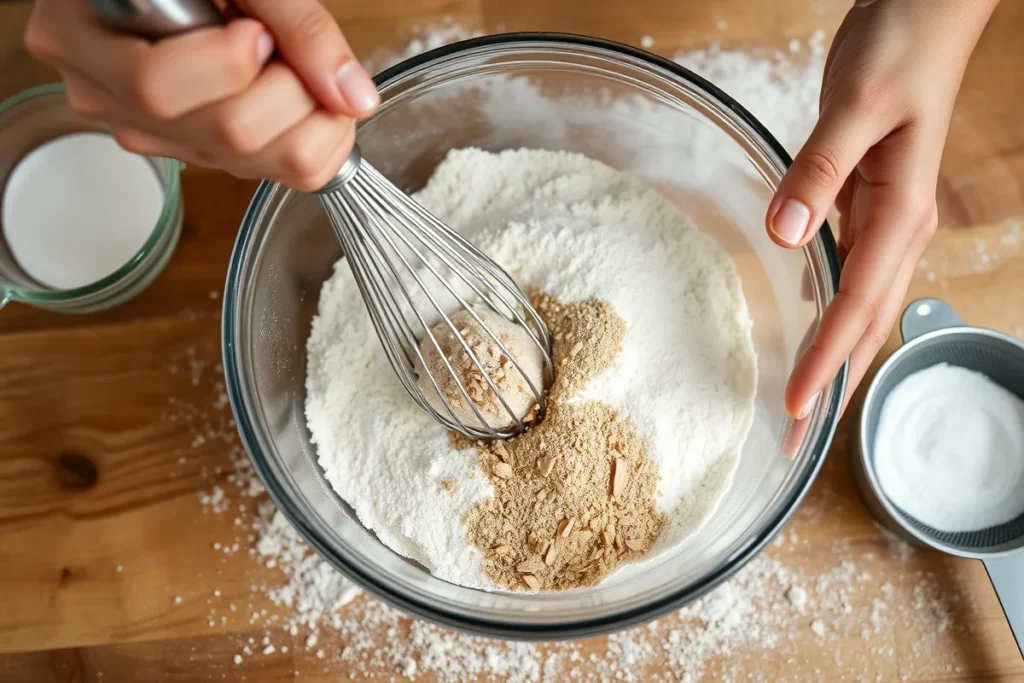Introduction
Brioche is a rich, buttery bread loved for its light and fluffy texture. Originating from France, this versatile bread can be enjoyed as part of a savory meal or transformed into a sweet treat. While butter, eggs, and sugar play a vital role in its signature flavor, the choice of flour is equally important. Selecting the best flour for brioche ensures the dough rises perfectly and achieves its characteristic airy structure.
Flour choice affects everything from gluten development to how well the dough holds its shape during baking. Because of this, bakers often debate whether to use bread flour, all-purpose flour, or specialty flours like T45. Each flour type offers unique qualities that can influence the final outcome.
In this guide, we’ll explore the ideal flour options for brioche, their benefits, and how to make the right choice for your baking needs. Whether you’re a novice baker or a seasoned pro, understanding flour selection is key to mastering the art of brioche and making it unique among breads.
Understanding Flour Types
Flour is the foundation of any bread recipe, and for brioche, it plays an even more critical role. Different types of flour vary in their protein content, gluten-forming potential, and texture, all of which impact how your brioche dough performs. Choosing the best flour for brioche means understanding these differences and selecting the one that best suits your needs.

How Flour Is Classified
Flour is often classified by its protein content and intended use. High-protein flours like bread flour contain more gluten-forming proteins, which give structure and elasticity to the dough. On the other hand, low-protein flours like cake flour produce softer, more delicate results.
In France, flour is classified by “T” numbers, such as T45 and T55. These indicate the ash content, which essentially measures how refined the flour is. T45 is a popular choice for brioche because of its fine texture and low ash content, contributing to the bread’s light and airy crumb.
The Role of Protein and Gluten
The protein in flour is what creates gluten, the network of strands that traps air and allows bread to rise. For brioche, a balance is necessary. Too much protein can result in a chewy, dense loaf, while too little can cause the dough to collapse. That’s why choosing flour with moderate protein content, such as all-purpose or a blend of bread and cake flours, is often ideal.
Why Flour Selection Matters for Brioche
Brioche dough is enriched with butter and eggs, which make it heavier than traditional bread dough. The flour must have enough strength to support these ingredients without compromising the bread’s soft and tender texture. This balance is what makes flour selection so vital for baking perfect brioche.
Best Flours for Brioche
The best flour for brioche depends on your desired texture, available ingredients, and baking expertise. Each type of flour brings something unique to the table, from structure to flavor. Below, we break down the most commonly used flours for making brioche and their specific advantages.
Bread Flour
Bread flour is a top choice for brioche because of its high protein content, usually around 12-14%. This high protein level results in more gluten, which provides the dough with the strength needed to rise and hold its shape.
Advantages:
- Produces a sturdy dough that can handle the weight of butter and eggs.
- Results in a slightly chewy yet tender texture.
Considerations:
- The higher protein content may make the dough less soft than other options.
- You may need to adjust hydration, as bread flour absorbs more liquid.
Bread flour is perfect for bakers who prefer a structured and resilient brioche loaf, ideal for slicing and toasting.
All-Purpose Flour
All-purpose flour offers a more versatile option for baking brioche. With a protein content of around 10-12%, it strikes a balance between strength and tenderness, making it a suitable choice for beginners.
Advantages:
- Readily available in most kitchens.
- Creates a soft, tender crumb while maintaining enough structure.
Considerations:
- May not develop as much gluten as bread flour, potentially requiring extra kneading.
All-purpose flour is an excellent choice if you’re looking for convenience without compromising the quality of your brioche.
French T45 Flour
For an authentic French brioche, T45 flour is often the preferred choice. Known for its fine texture and low ash content, T45 flour produces a light, airy crumb with a delicate flavor.
Advantages:
- Specifically designed for enriched doughs like brioche and croissants.
- Provides a luxurious texture and authentic taste.
Considerations:
- May be harder to find outside of Europe.
- Slightly more expensive than other flours.
French T45 flour is ideal for bakers seeking to replicate the traditional French brioche experience.
Cake Flour
Cake flour, with its low protein content of around 7-9%, is not typically the first choice for brioche but can be used in specific cases. Its soft texture results in an exceptionally tender crumb.
Advantages:
- Creates a very soft and light brioche.
- Works well in combination with higher-protein flours.
Considerations:
- Lacks the strength needed for brioche to rise properly on its own.
- Best used as part of a blend with bread or all-purpose flour.
Cake flour is a great addition when you want to soften the texture of your brioche while maintaining structure through a flour blend.
Blending Flours for Optimal Results

Creating the best brioche often involves blending different flours to balance strength and softness. By combining flours with varying protein levels, you can achieve a dough that supports its rich ingredients while maintaining a tender texture.
Why Blend Flours?
Blending flours allows you to customize the properties of your dough. For example, mixing bread flour with cake flour can give you the structural benefits of bread flour while softening the final texture with the lower protein content of cake flour. This approach is especially useful for enriched doughs like brioche, which require strength but also benefit from a delicate crumb.
Recommended Flour Blends
Bread Flour and All-Purpose Flour
A 50:50 ratio of bread flour to all-purpose flour is a popular choice. This combination enhances gluten formation without making the dough overly dense.
Benefits:
- Improved elasticity and rise.
- A balanced crumb that’s soft but structured.
Bread Flour and Cake Flour
For an extra-soft brioche, you can blend 75% bread flour with 25% cake flour. This mix is ideal for recipes that emphasize a tender texture.
Benefits:
- Softer crumb without losing dough strength.
- Ideal for sweeter, dessert-style brioche.
T45 Flour with All-Purpose Flour
If you have access to T45 flour but want to stretch your supply, mixing it with all-purpose flour is a practical option. Use a 60:40 ratio of T45 to all-purpose flour.
Benefits:
- Retains much of the authentic French texture.
- More economical while maintaining quality.
Tips for Successful Flour Blending
- Experiment Gradually
Start with small adjustments to find the perfect ratio for your desired outcome. - Adjust Hydration Levels
Different flours absorb water differently. Monitor your dough’s hydration and adjust the liquid as needed. - Focus on Kneading and Resting
Proper kneading ensures that gluten develops evenly, even in blended doughs. Allow adequate resting time for the dough to relax and rise.
Blending flours gives you the flexibility to create brioche that meets your personal preferences, whether you prefer a sturdier loaf or a more delicate crumb.
Factors Influencing Flour Choice
Choosing the best flour for brioche isn’t just about protein content or gluten strength. Several external factors can influence your selection, and understanding these will help you adapt your recipe for the best results.
Regional Flour Availability
Flour availability varies by location, which can impact your options for baking brioche. In Europe, French T45 flour is common, while in the U.S., bread flour and all-purpose flour are more accessible. If you can’t find T45 flour locally, experimenting with blends of bread and cake flours can mimic its characteristics.
Tip: Check specialty or online stores for imported flours if you’re aiming for an authentic brioche texture.
Organic and Specialty Flours
Organic flours have become increasingly popular for their rich flavor and lack of additives. While they can enhance the taste of brioche, they often behave differently in recipes due to their natural processing. Specialty flours, such as stone-ground varieties, add a unique depth of flavor but may produce a slightly denser loaf.
Tip: If using organic or specialty flours, monitor the dough’s hydration closely, as these flours may absorb water differently.
Flour Freshness
Fresh flour can significantly improve the quality of your brioche. Old or improperly stored flour may lose its gluten-forming potential, leading to flat or dense results. Always check expiration dates and store flour in a cool, dry place to maintain its quality.
Tip: For the best flavor, consider using freshly milled flour if available.
Recipe Adjustments for Flour Strength
Different flours vary in their absorption rates and elasticity. If using a higher-protein flour like bread flour, you may need to slightly increase the liquid in your recipe. Conversely, lower-protein flours, such as all-purpose or cake flour, may require less liquid and additional kneading to build gluten.
Tip: Start with small adjustments and observe the dough’s texture. A well-mixed brioche dough should be smooth, elastic, and slightly sticky.
By considering these factors, you can adapt your brioche recipe to suit the flour available in your region or the specific characteristics you desire in the finished loaf.
Common Mistakes when Selecting Flour For Brioche
Selecting the wrong flour or using it incorrectly can lead to disappointing results when making brioche. Avoiding these common mistakes will ensure your brioche turns out perfectly every time.
Using Low-Quality or Unsuitable Flour
The quality of your flour significantly impacts the texture and flavor of your brioche. Low-quality flours may lack the consistency and strength needed for enriched doughs. Additionally, using flours with very low protein content, such as pastry flour, can result in a brioche that doesn’t rise properly.
Solution: Always opt for high-quality bread flour, all-purpose flour, or French T45 flour from trusted brands. These flours provide the consistency and strength required for brioche.
Overlooking Protein Content
Protein content plays a critical role in gluten formation, which is essential for brioche dough. Using flour with too little protein can cause the dough to collapse, while flour with too much protein may result in a dense or overly chewy texture.
Solution: Choose flour with moderate protein levels (10-12%) to balance structure and softness. If unsure, blend flours to achieve the desired protein content.
Ignoring Hydration Adjustments
Each type of flour absorbs liquid differently. Bread flour, for example, typically requires more water than all-purpose or cake flour. Failing to adjust hydration levels can lead to dry, crumbly dough or sticky, unmanageable dough.
Solution: Gradually add liquid to your dough while mixing, and adjust as needed. A good brioche dough should be soft, slightly sticky, and elastic.
Skipping the Flour Sift
Even minor clumps in your flour can disrupt the consistency of your dough. This is especially true when working with finely milled flours like T45.
Solution: Always sift your flour before adding it to your recipe. This ensures a smooth, lump-free dough that rises evenly.
Failing to Store Flour Properly
Flour that’s exposed to air, moisture, or heat can lose its gluten-forming potential and develop off flavors.
Solution: Store flour in airtight containers in a cool, dry place. For long-term storage, consider refrigerating or freezing your flour to preserve its freshness.
By avoiding these common mistakes, you can make sure your brioche achieves the perfect balance of lightness, structure, and flavor.
Conclusion
Choosing the best flour for brioche is a key step in crafting this luxurious and buttery bread. The type of flour you use directly influences the dough’s structure, rise, and overall texture. While bread flour provides strength and resilience, all-purpose flour offers a balanced softness, and French T45 flour brings a traditional touch for authentic brioche. For added customization, blending flours can be a great way to achieve your desired texture and flavor.
Remember, external factors like regional availability, freshness, and proper storage also play a significant role in your flour selection. By understanding these details and avoiding common mistakes, such as ignoring protein content or hydration levels, you can set yourself up for brioche success.
Experimenting with different flours and techniques is part of the fun of baking. Whether you’re aiming for a light, airy loaf or a sturdier slice for sandwiches, mastering your flour choice ensures every brioche you bake is both delicious and rewarding.
You can also find out How to Make the Perfect Brioche In Our Step-by-Step Guide that we made previously.

